2019-2020学年度小学六年级上册英语unit 5 Open Day牛津上海版练习题第十五篇
- 格式:docx
- 大小:507.41 KB
- 文档页数:6

Unit 5 Open DayTasks in this unitTalking about future events; planning events; sequencing activities; writing invitations; reading captions; writing a description of events.Period OneLanguage focus:Using the simple future tense to talk about future eventse.g., Your parents will arrive at two o’clock.Usin g adverbs of timee.g., What will they do first?Language skills:ListeningRecognize the difference in the use of intonation in questions, statements (including approval) and commands, and respond appropriatelySpeakingUse appropriate intonation and stress to convey intended meanings and feelings ReadingRead written language in meaningful chunksWritingDevelop written texts by expressing own ideasMaterials:1.Student’s Book 6A page 322.Workbook 6A pages 28 and 293.Cassette 6A4.Cassette p layerPre-task preparationAsk the students: What do we do on Open Day? What do parents do? Write a list on the board as the students mention activities.Play the cassette for Look and learn. The students repeat.While-task procedure1.Give the students time to read Look and read silently.2.Play the cassette. The students follow in their books.3.In groups of six, students practise the dialogue. Select groups to read thedialogue.4.In pairs, students complete the programme with the correct time.5.Ask questions about the programme: e.g., What time will the parents arrive?What will they do first/next/then/after that/ finally? When?6.Select other groups to read the dialogue.7.Ask further questions: e.g., Where will they meet their parents? What willthey look at in the classroom and Arts and Crafts room> What will they do in the hall? What will they look at in the library? What will they have in the Music room?8.Consolidation:Workbook 6a page 28-29Period TwoLanguage focus:Using the simple future tense to talk about future eventse.g., I’ll be in classroom 6ALanguage skills:ListeningListen for specific informationSpeakingMaintain an interaction by agreeingReadingRead written language in meani ngful chunksMaterials:1.Student’s B ook 6A page 332.Workbook 6A pages 313.Cassette 6A4.Cassette playerPre-task preparationReview: ground/ first/second/third/ floor. Ask: Where is the library/hall/ Arts and Crafts room? To elicit: e.g., It’s on the first floor.While-task procedure1. Give the students time to look at the floor plan of the school. Ask individualstudents to read the names of the rooms. Ask: Where is the Arts and Crafts room? To elicit: It’s on the third floor.2. Play the cassette for Look and Listen. The students listen. Ask: Where will kitty be? To elicit: She’ll be in the Arts and Cra fts room.3. Select students to be Kitty, Peter, Alice and Jill. Ask: Where will you be, Kitty? To elicit: I’ll be on the third floor.4. In pairs, students practise Ask and answer.5. Workbook 6A page 31a. Give the students time to look at the pictures.b. Play the cassette. The students listen and matc h.ConsolidationWorkbook 6A page 32Period ThreeLanguage focus:Using the simple future tense to talk about fut ure eventse.g., What will our parents do first?Using formulaic expressions to begin and end a lettere.g., Dear…; YoursLanguage skills:ListeningIdentify details that support a main ideaSpeakingMaintain an interaction by replyingReadingRecognize format and language features when reading non-narrative texts WritingDevelop written texts by using appropriate format, conventions and language featuresMaterials:1.Student’s Book 6A page 342.Workbook 6A pages 32, 343.Cassette 6A4.Cassette playerPre-task preparationTalk about invitations. Ask: When do you send invitations? To elicit: e.g., for a birthday party. Try to get the students to mention other occasions.While-task procedure1. Read the outline of the dialogue in Plan and speak.Ask the students to suggest a list of five activities. Write them on the board.2. In pairs, students decide on the activities and complete the programme. They then practice the dialogue.3. Ask individual students about their programme using the questions in Plan and speak. q5 The students complete Read an write. Ask one or two students to read their completed reports.4.Give students time to read Read, thi nk and write. In groups, students discuss how to complete the invitation. Ask a representative from each group to rea their invitation.5.The students write the invitation to their parents. Ask individual students to readtheir invitations.ConsolidationWorkbook 6A pages 32, 34Period FourLanguage focus:Using the simple past tense to talk about past activitiese.g., The parents arrived at Rose Garden Schoo l at two o’clock.Language skills:ListeningListen for specific informationSpeakingMaintain an interaction by replyingReadingIdentify details that support a main ideaWritingD evelop written texts by presenting main and supporting ideasMaterials:1.Student’s Book 6A page 352.Cassette 6A3.Cassette playerPre-task preparationIntroduce the past forms of the verbs on this page. Write the verbs on the board; arrive- arrived; visit- visited; look-looked; listen- listened; have- had.Ask: What time did you arrive at school? To elicit: e.g., I arrived at school at eight o’clock. Continue with: When did you visit your grandparents? When did you look at the noticeboard? What time did you have your breakfast?While-task procedure1 Give the students time to look at the pictures in Read and Match.2 Play the cassette. The students listen. Play the cassette again. The students repeat.3. In pairs, students match the pictures and sentences. Ask individual students to reada sentence in the correct order.ConsolidationCopy the new wordsRecite the passage.。

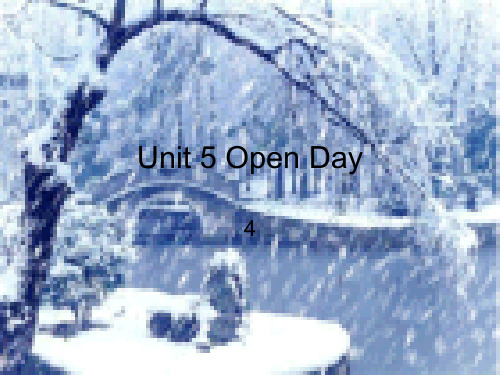
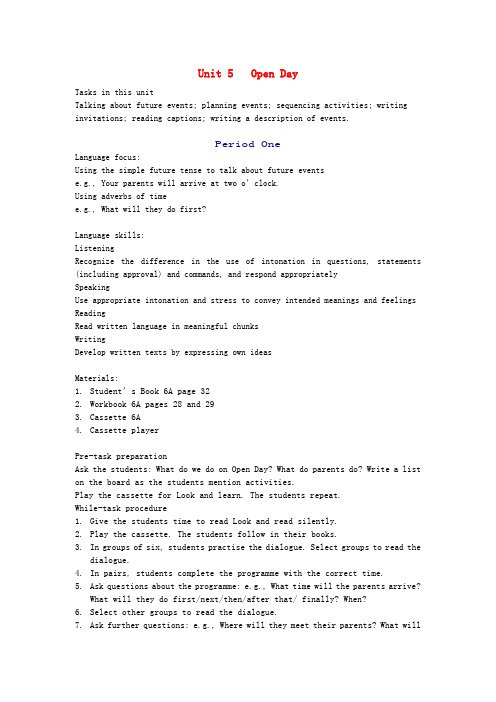
Unit 5 Open DayTasks in this unitTalking about future events; planning events; sequencing activities; writing invitations; reading captions; writing a description of events.Period OneLanguage focus:Using the simple future tense to talk about future eventse.g., Your parents will arrive at two o’clock.Using adverbs of timee.g., What will they do first?Language skills:ListeningRecognize the difference in the use of intonation in questions, statements (including approval) and commands, and respond appropriatelySpeakingUse appropriate intonation and stress to convey intended meanings and feelings ReadingRead written language in meaningful chunksWritingDevelop written texts by expressing own ideasMaterials:1.Student’s Book 6A page 322.Workbook 6A pages 28 and 293.Cassette 6A4.Cassette playerPre-task preparationAsk the students: What do we do on Open Day? What do parents do? Write a list on the board as the students mention activities.Play the cassette for Look and learn. The students repeat.While-task procedure1.Give the students time to read Look and read silently.2.Play the cassette. The students follow in their books.3.In groups of six, students practise the dialogue. Select groups to read thedialogue.4.In pairs, students complete the programme with the correct time.5.Ask questions about the programme: e.g., What time will the parents arrive?What will they do first/next/then/after that/ finally? When?6.Select other groups to read the dialogue.7.Ask further questions: e.g., Where will they meet their parents? What willthey look at in the classroom and Arts and Crafts room> What will they do in the hall? What will they look at in the library? What will they have in the Music room?8.Consolidation:Workbook 6a page 28-29Period TwoLanguage focus:Using the simple future tense to talk about future eventse.g., I’ll be in classroom 6ALanguage skills:ListeningListen for specific informationSpeakingMaintain an interaction by agreeingReadingRead written language in meaningful chunksMaterials:1.Student’s Book 6A page 332.Workbook 6A pages 313.Cassette 6A4.Cassette playerPre-task preparationReview: ground/ first/second/third/ floor. Ask: Where is the library/hall/ Arts and Crafts room? To elicit: e.g., It’s on the first floor.While-task procedure1. Give the students time to look at the floor plan of the school. Ask individual students to read the names of the rooms. Ask: Where is the Arts and Crafts room? To elicit: It’s on the third floor.2. Play the cassette for Look and Listen. The students listen. Ask: Where will kitty be? To elicit: She’ll be in the Arts and Crafts room.3. Select students to be Kitty, Peter, Alice and Jill. Ask: Where will you be, Kitty? To elicit: I’ll be on the third floor.4. In pairs, students practise Ask and answer.5. Workbook 6A page 31a. Give the students time to look at the pictures.b. Play the cassette. The students listen and match.ConsolidationWorkbook 6A page 32Period ThreeLanguage focus:Using the simple future tense to talk about future eventse.g., What will our parents do first?Using formulaic expressions to begin and end a lettere.g., Dear…; YoursLanguage skills:ListeningIdentify details that support a main ideaSpeakingMaintain an interaction by replyingReadingRecognize format and language features when reading non-narrative texts WritingDevelop written texts by using appropriate format, conventions and language featuresMaterials:1.Student’s Book 6A page 342.Workbook 6A pages 32, 343.Cassette 6A4.Cassette playerPre-task preparationTalk about invitations. Ask: When do you send invitations? To elicit: e.g., for a birthday party. Try to get the students to mention other occasions.While-task procedure1. Read the outline of the dialogue in Plan and speak.Ask the students to suggest a list of five activities. Write them on the board.2. In pairs, students decide on the activities and complete the programme. They then practice the dialogue.3. Ask individual students about their programme using the questions in Plan and speak. q5 The students complete Read an write. Ask one or two students to read their completed reports.4.Give students time to read Read, think and write. In groups, students discuss how to complete the invitation. Ask a representative from each group to rea their invitation.5.The students write the invitation to their parents. Ask individual students toread their invitations.ConsolidationWorkbook 6A pages 32, 34Period FourLanguage focus:Using the simple past tense to talk about past activitiese.g., The parents arrived at Rose Garden School at two o’clock.Language skills:ListeningListen for specific informationSpeakingMaintain an interaction by replyingReadingIdentify details that support a main ideaWritingDevelop written texts by presenting main and supporting ideasMaterials:1.Student’s Book 6A page 352.Cassette 6A3.Cassette playerPre-task preparationIntroduce the past forms of the verbs on this page. Write the verbs on the board; arrive- arrived; visit- visited; look-looked; listen- listened; have- had. Ask: What time did you arrive at school? To elicit: e.g., I arrived at school at eight o’clock. Continue with: When did you visit your grandparents? When did you look at the noticeboard? What time did you have your breakfast?While-task procedure1 Give the students time to look at the pictures in Read and Match.2 Play the cassette. The students listen. Play the cassette again. The students repeat.3. In pairs, students match the pictures and sentences. Ask individual students to read a sentence in the correct order.ConsolidationCopy the new wordsRecite the passage.。

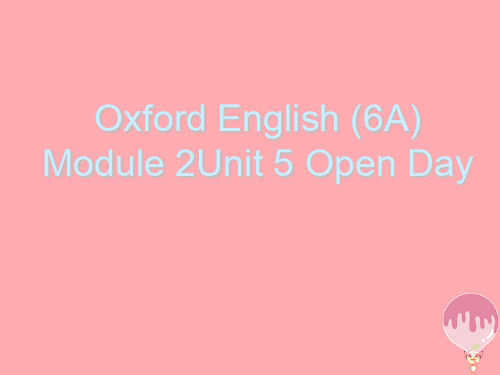

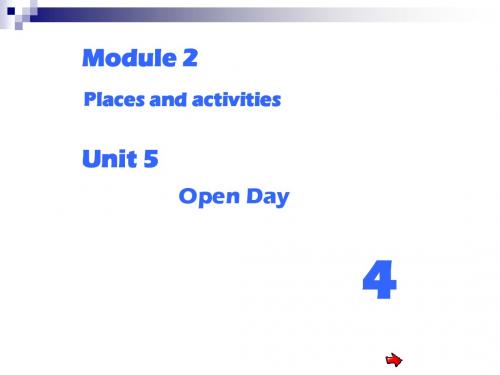
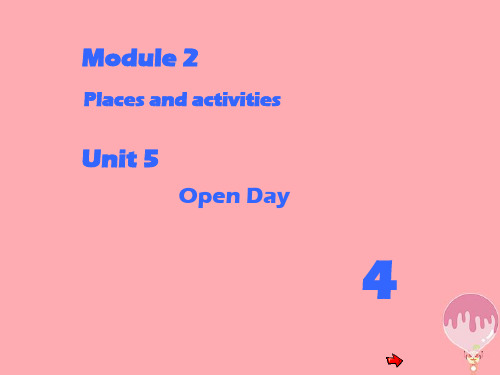
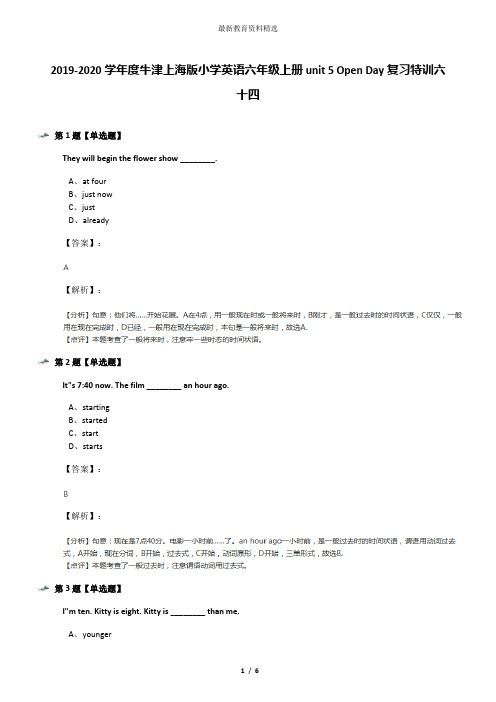
2019-2020学年度牛津上海版小学英语六年级上册unit 5 Open Day复习特训六十四第1题【单选题】They will begin the flower show ________.A、at fourB、just nowC、justD、already【答案】:【解析】:第2题【单选题】It"s 7:40 now. The film ________ an hour ago.A、startingB、startedC、startD、starts【答案】:【解析】:第3题【单选题】I"m ten. Kitty is eight. Kitty is ________ than me.A、youngerB、biggestC、youngD、How【答案】:【解析】:第4题【单选题】I ________ some people talking in the next room.A、1istenB、hearC、listen toD、hearing【答案】:【解析】:第5题【阅读理解】判断下面的句子是否与短文的意思相同。
The sun, the moon and the stars are all in the sky. We see the sun in the day. We see the moon and the stars at night. The sun is a ball. It is bigger than the moon. The sun has a family. It is the biggest in the family. The moon is a ball, too. It is much smaller than the sun. It is smaller than the stars. The light on the moon comes from the sun. The stars look smaller than the sun and the moon. But most of the stars are bigger than the sun. They are very far away from us, so they look small. All day the stars are in the sky. But the light from the sun is too bright. We cannot see the stars in the day.We can see the moon and the stars in the day.A、正确B、错误The moon is smaller than the sun.A、正确B、错误The light on the moon comes from the stars.A、正确B、错误The stars are very far away from the people.A、正确B、错误Most of the stars are smaller than the sun.A、正确B、错误【答案】:【解析】:第6题【句型转换】Mike lives far away from school. (改为一般疑问句)______ Mike ______ far away from school?【答案】:【解析】:第7题【选词填空(词汇运用)】Would you like ______ (meeting/to meet) my sister tomorrow? 【答案】:【解析】:第8题【选词填空(词汇运用)】Alice always ______ (go/goes) to school with her classmate, Kitty. 【答案】:【解析】:第9题【语法填空】When will they arrive ______ Shanghai Station? (填介词)【答案】:【解析】:第10题【语法填空】I"ll meet the new comer ______ the entrance. (填介词)【答案】:【解析】:第11题【语法填空】When does your mother come home ______ work? (填介词) 【答案】:【解析】:第12题【语法填空】There is an ______ (invite) on the shelf. Please get it for me. 【答案】:【解析】:第13题【语法填空】—Who are you waiting ______?—Mr Black. I have something important to tell him. 【答案】:【解析】:第14题【语法填空】______ that, he will go back to school. (填介词) 【答案】:【解析】:第15题【语法填空】How many ______ (visit) are from Tokyo?【答案】:【解析】:。
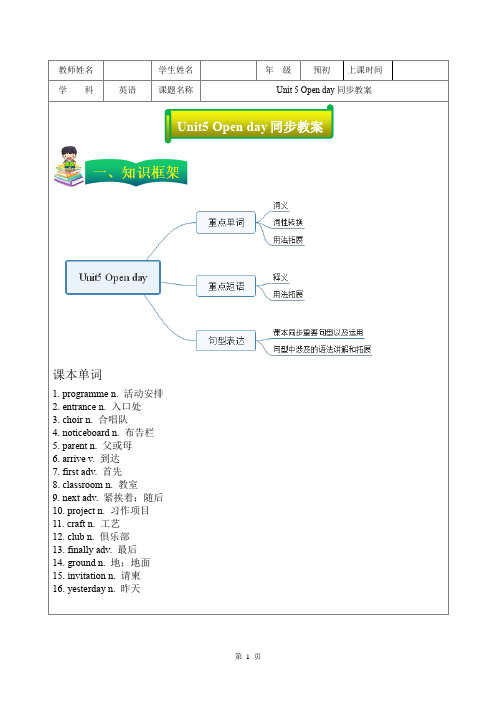
Unit5 Open day同步教案课本单词1. programme n. 活动安排2. entrance n. 入口处3. choir n. 合唱队4. noticeboard n. 布告栏5. parent n. 父或母6. arrive v. 到达7. first adv. 首先8. classroom n. 教室9. next adv. 紧挨着;随后10. project n. 习作项目11. craft n. 工艺12. club n. 俱乐部13. finally adv. 最后14. ground n. 地;地面15. invitation n. 请柬16. yesterday n. 昨天Ⅰ. Important words and phrases:Words:1. entrance n. 入口______________________ 在入口处【联想】___________ v. 进入enter some place=go/walk/come into some place进入某地He enters the room quietly.= He walks into the room quietly.他安静地进入了房间。
2. n. 信息板You can find a lot of information___________________________. 你能在信息板上找到很多信息。
3. plan(1) v. 计划★_________________________ 计划做某事We plan to have a meeting next week。
我们计划下周开个会。
★plan sth. 计划某事They are planning a meeting. 他们正在计划一次会议。
(2) n. 计划__________________________________ ? 你们有假期计划了吗?4. arrive in, arrive at, get to和reach四者都可以表示“到达”;arrive in后接“较大的地方”,arrive at后接“较小的地方”,get to和reach后直接加宾语。
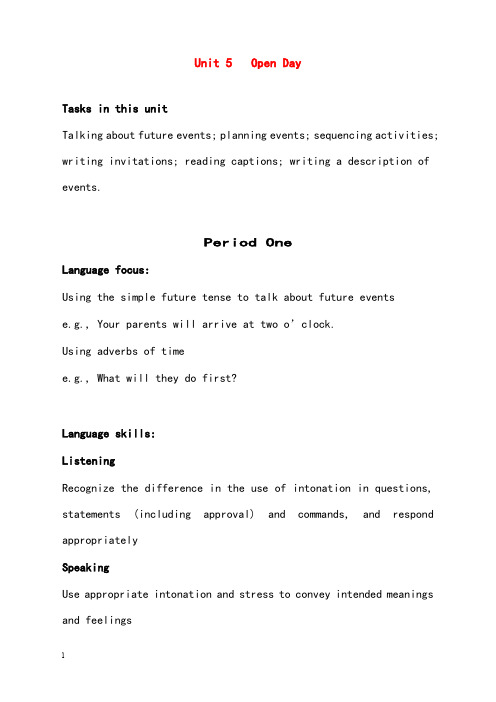
Unit 5 Open DayTasks in this unitTalking about future events; planning events; sequencing activities; writing invitations; reading captions; writing a description of events.Period OneLanguage focus:Using the simple future tense to talk about future eventse.g., Your parents will arrive at two o’clock.Using adverbs of timee.g., What will they do first?Language skills:ListeningRecognize the difference in the use of intonation in questions, statements (including approval) and commands, and respond appropriatelySpeakingUse appropriate intonation and stress to convey intended meanings and feelingsReadingRead written language in meaningful chunksWritingDevelop written texts by expressing own ideasMaterials:1.Student’s Book 6A page 322.Workbook 6A pages 28 and 293.Cassette 6A4.Cassette playerPre-task preparationAsk the students: What do we do on Open Day? What do parents do? Write a list on the board as the students mention activities. Play the cassette for Look and learn. The students repeat. While-task procedure1.Give the students time to read Look and read silently.2.Play the cassette. The students follow in their books.3.In groups of six, students practise the dialogue. Selectgroups to read the dialogue.4.In pairs, students complete the programme with the correcttime.5.Ask questions about the programme: e.g., What time will theparents arrive? What will they do first/next/then/after that/ finally? When?6.Select other groups to read the dialogue.7.Ask further questions: e.g., Where will they meet theirparents? What will they look at in the classroom and Arts and Crafts room> What will they do in the hall? What will they look at in the library? What will they have in the Music room? 8.Consolidation:Workbook 6a page 28-29Period TwoLanguage focus:Using the simple future tense to talk about future eventse.g., I’ll be in classroom 6ALanguage skills:ListeningListen for specific informationSpeakingMaintain an interaction by agreeingReadingRead written language in meaningful chunksMaterials:1.Student’s Book 6A page 332.Workbook 6A pages 313.Cassette 6A4.Cassette playerPre-task preparationReview: ground/ first/second/third/ floor. Ask: Where is the library/hall/ Arts and Crafts room? To elicit: e.g., It’s on the first floor.While-task procedure1. Give the students time to look at the floor plan of the school. Ask individual students to read the names of the rooms. Ask: Where is the Arts and Crafts room? To elicit: It’s on the third floor.2. Play the cassette for Look and Listen. The students listen. Ask: Where will kitty be? To elicit: She’ll be in the Arts and Crafts room.3. Select students to be Kitty, Peter, Alice and Jill. Ask: Where will you be, Kitty? To elicit: I’ll be on the third floor.4. In pairs, students practise Ask and answer.5. Workbook 6A page 31a. Give the students time to look at the pictures.b. Play the cassette. The students listen and match.ConsolidationWorkbook 6A page 32Period ThreeLanguage focus:Using the simple future tense to talk about future eventse.g., What will our parents do first?Using formulaic expressions to begin and end a lettere.g., Dear…; YoursLanguage skills:ListeningIdentify details that support a main ideaSpeakingMaintain an interaction by replyingReadingRecognize format and language features when reading non-narrative textsWritingDevelop written texts by using appropriate format, conventions and language featuresMaterials:1.Student’s Book 6A page 342.Workbook 6A pages 32, 343.Cassette 6A4.Cassette playerPre-task preparationTalk about invitations. Ask: When do you send invitations? To elicit: e.g., for a birthday party. Try to get the students to mention other occasions.While-task procedure1. Read the outline of the dialogue in Plan and speak.Ask the students to suggest a list of five activities. Write them on the board.2. In pairs, students decide on the activities and complete theprogramme. They then practice the dialogue.3. Ask individual students about their programme using the questions in Plan and speak. q5 The students complete Read an write. Ask one or two students to read their completed reports.4.Give students time to read Read, think and write. In groups, students discuss how to complete the invitation. Ask a representative from each group to rea their invitation.5.The students write the invitation to their parents. Askindividual students to read their invitations.ConsolidationWorkbook 6A pages 32, 34Period FourLanguage focus:Using the simple past tense to talk about past activitiese.g., The parents arrived at Rose Garden School at two o’clock.Language skills:ListeningListen for specific informationSpeakingMaintain an interaction by replyingReadingIdentify details that support a main ideaWritingDevelop written texts by presenting main and supporting ideas Materials:1.Student’s Book 6A page 352.Cassette 6A3.Cassette playerPre-task preparationIntroduce the past forms of the verbs on this page. Write the verbs on the board; arrive- arrived; visit- visited; look-looked; listen- listened; have- had.Ask: What time did you arrive at school? To elicit: e.g., I arrived at school at eight o’clock. Continue with: When did you visit your grandparents? When did you look at the noticeboard? What time did you have your breakfast?While-task procedure1 Give the students time to look at the pictures in Read and Match.2 Play the cassette. The students listen. Play the cassette again. The students repeat.3. In pairs, students match the pictures and sentences. Ask individual students to read a sentence in the correct order.ConsolidationCopy the new wordsRecite the passage.。

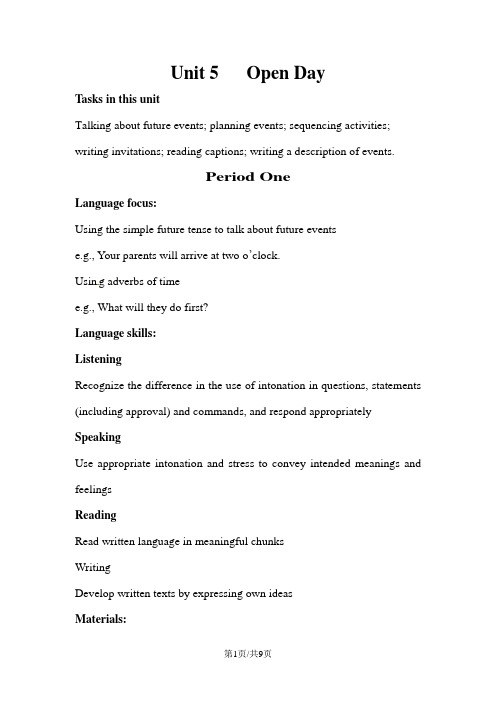
Unit 5 Open DayTasks in this unitTalking about future events; planning events; sequencing activities; writing invitations; reading captions; writing a description of events.Period OneLanguage focus:Using the simple future tense to talk about future eventse.g., Your parents will arrive at two o’clock.Usin g adverbs of timee.g., What will they do first?Language skills:ListeningRecognize the difference in the use of intonation in questions, statements (including approval) and commands, and respond appropriately SpeakingUse appropriate intonation and stress to convey intended meanings and feelingsReadingRead written language in meaningful chunksWritingDevelop written texts by expressing own ideasMaterials:1.Student’s Book 6A page 322.Workbook 6A pages 28 and 29[来源:]3.Cassette 6A4.Cassette p layerPre-task preparationAsk the students: What do we do on Open Day? What do parents do? Write a list on the board as the students mention activities.Play the cassette for Look and learn. The students repeat.While-task procedure1.Give the students time to read Look and read silently.2.Play the cassette. The students follow in their books.3.In groups of six, students practise the dialogue. Select groups toread the dialogue.4.In pairs, students complete the programme with the correct time.5.Ask questions about the programme: e.g., What time will theparents arrive? What will they do first/next/then/after that/ finally?When?6.Select other groups to read the dialogue.[来源:ZXXK]7.Ask further questions: e.g., Where will they meet their parents?What will they look at in the classroom and Arts and Crafts room> What will they do in the hall? What will they look at in the library?What will they have in the Music room?Consolidation:Workbook 6a page 28-29[来源:]Period TwoLanguage focus:Using the simple future tense to talk about future eventse.g., I’ll be in classroom 6ALanguage skills:ListeningListen for specific informationSpeakingMaintain an interaction by agreeingReadingRead written language in meani ngful chunksMaterials:1.Student’s Book 6A page 332.Workbook 6A pages 313.Cassette 6A4.Cassette playerPre-task preparationReview: ground/ first/second/third/ floor. Ask: Where is the library/hall/ Arts and Crafts room? To elicit: e.g., It’s on the first floor.While-task procedure1. Give the students time to look at the floor plan of the school. Ask individual students to read the names of the rooms. Ask: Where is the Arts and Crafts room? To elicit: It’s on the third floor.2. Play the cassette for Look and Listen. The students listen. Ask: Where will kitty be? To elicit: She’ll be in the Arts and Crafts room.3. Select students to be Kitty, Peter, Alice and Jill. Ask: Where will you be, Kitty? To elicit: I’ll be on the third floor.4. In pairs, students practise Ask and answer.5. Workbook 6A page 31a. Give the students time to look at the pictures.b. Play the cassette. The students listen and match.ConsolidationWorkbook 6A page 32Period ThreeLanguage focus:Using the simple future tense to talk about fut ure eventse.g., What will our parents do first?Using formulaic expressions to begin and end a lettere.g., Dear…; YoursLanguage skills:ListeningIdentify details that support a main ideaSpeakingMaintain an interaction by replyingReadingRecognize format and language features when reading non-narrative textsWritingDevelop written texts by using appropriate format, conventions and language features[来源:ZXXK]Materials:1.Student’s Book 6A page 342.Workbook 6A pages 32, 343.Cassette 6A4.Cassette playerPre-task preparationTalk about invitations. Ask: When do you send invitations? To elicit: e.g., for a birthday party. Try to get the students to mention other occasions. While-task procedure1. Read the outline of the dialogue in Plan and speak.Ask the students to suggest a list of five activities. Write them on the board.2. In pairs, students decide on the activities and complete the programme.They then practice the dialogue.3. Ask individual students about their programme using the questions in Plan and speak. q5 The students complete Read an write. Ask one or two students to read their completed reports.4.Give students time to read Read, think and write. In groups, students discuss how to complete the invitation. Ask a representative from each group to rea their invitation.5.The students write the invitation to their parents. Ask individualstudents to read their invitations.ConsolidationWorkbook 6A pages 32, 34Period FourLanguage focus:Using the simple past tense to talk about past activitiese.g., The parents arrived at Rose Garden Schoo l at two o’clock. Language skills:ListeningListen for specific informationSpeakingMaintain an interaction by replyingReadingIdentify details that support a main ideaWritingDevelop written texts by presenting main and supporting ideas Materials:[来源:学+科+网Z+X+X+K]1.Student’s Book 6A page 352.Cassette 6A3.Cassette playerPre-task preparationIntroduce the past forms of the verbs on this page. Write the verbs on the board; arrive- arrived; visit- visited; look-looked; listen- listened; have- had.Ask: What time did you arrive at school? To elicit: e.g., I arrived at school at eight o’clock. Continue with: When did you visit your grandparents? When did you look at the noticeboard? What time did you have your breakfast?While-task procedure1 Give the students time to look at the pictures in Read and Match.2 Play the cassette. The students listen. Play the cassette again. The students repeat.3. In pairs, students match the pictures and sentences. Ask individual students to read a sentence in the correct order.宋以后,京师所设小学馆和武学堂中的教师称谓皆称之为“教谕”。

2019-2020学年度小学六年级上册英语unit 5 Open Day牛津上海版复习巩固第八十四篇第1题【单选题】Please ________ to the library with your teacher.A、wentB、goingC、goesD、go【答案】:【解析】:第2题【单选题】This is a photo of ________.A、IB、myC、mineD、me【答案】:【解析】:第3题【单选题】Jane wants me ________ a model plane for her.A、to makeB、makeC、makesD、making【答案】:【解析】:第4题【单选题】December is the ________ month of a year and I like December.A、firstB、secondC、lastD、third【答案】:【解析】:第5题【句型转换】Kitty"s father will get to the school cinema at two thirty. (改写句子,意思不变) Kitty"s father will ______ the school cinema at ______ ______ two.【答案】:【解析】:第6题【句型转换】My parents visited our classroom last week. (改为否定句)【答案】:【解析】:第7题【句型转换】Kitty went to the hospital early yesterday. (将划线部分改为every day) 【答案】:【解析】:第8题【句型转换】They will visit our classroom at three this afternoon.(对划线部分提问) 【答案】:【解析】:第9题【翻译】Do you want to ______?(参观我们的教室)【答案】:【解析】:第10题【语法填空】—How ______ you ______ (get)to the Shanghai Museum? —We ______ (take)the underground ______ (get)there. 【答案】:【解析】:第11题【语法填空】Wendy is writing some ______ to her relatives. (invite) 【答案】:【解析】:第12题【语法填空】The ______ (finally) meeting will be over.【答案】:【解析】:第13题【语法填空】—Who are you waiting ______?—Mr Black. I have something important to tell him.【答案】:【解析】:第14题【语法填空】Please wait for me at the second ______ (enter).【答案】:【解析】:第15题【语法填空】They will take some ______ at the Space Museum. (photo) 【答案】:【解析】:。

牛津版上海版六年级上册 Unit 5 Open Day 说课稿一. 教材分析牛津版上海版六年级上册Unit 5 Open Day的主题是关于学校开放日。
本单元通过描述学校开放日当天的活动,让学生学会用英语询问和描述时间、地点、活动等。
教材内容丰富,插图生动,贴近学生生活,能激发学生的学习兴趣。
本单元主要语言点包括一般现在时的用法、频度副词、时间状语以及询问和描述活动的表达方式。
二. 学情分析六年级的学生已经掌握了英语学习的基本语法和词汇,具备一定的听说读写能力。
他们在学习本单元时,已有的知识储备和经验将对学习起到积极的促进作用。
然而,学生对于一般现在时的用法、频度副词以及时间状语的掌握程度不一,需要在教学中加以引导和巩固。
此外,部分学生可能在描述活动时词汇选择和句子上存在困难,需要教师给予更多的关注和指导。
三. 说教学目标1.知识目标:(1)学会描述学校开放日当天的活动。
(2)掌握一般现在时的用法、频度副词、时间状语。
2.能力目标:(1)能够用英语询问和描述时间、地点、活动等。
(2)提高学生的听说读写能力,培养良好的英语学习习惯。
3.情感目标:(1)培养学生热爱学校、积极参与学校活动的情感。
(2)增强学生自信心,提高他们用英语表达自己的能力。
四. 说教学重难点1.教学重点:(1)描述学校开放日当天的活动。
(2)运用一般现在时、频度副词、时间状语进行表达。
2.教学难点:(1)一般现在时的用法。
(2)频度副词、时间状语的运用。
(3)描述活动时词汇选择和句子。
五. 说教学方法与手段1.教学方法:(1)任务型教学法:通过完成各种任务,让学生在实践中学会用英语描述活动。
(2)情境教学法:创设学校开放日的情境,让学生在真实的环境中学习英语。
(3)分组合作学习:培养学生团队合作精神,提高口语表达能力。
2.教学手段:(1)多媒体课件:利用课件展示学校开放日的图片、视频等,丰富教学内容,激发学生兴趣。
(2)实物道具:使用实物道具如门票、宣传册等,让学生更直观地了解学校开放日。

2019-2020学年度小学六年级上册英语unit 5 Open Day牛津上海版练习题第十五
篇
第1题【单选题】
When do you usually ________ TV in the evening?
A、look at
B、watch
C、see
D、notice
【答案】:
【解析】:
第2题【单选题】
Your parents will ________ at four o"clock this afternoon.
A、arrive at
B、get to
C、reach
D、arrive
【答案】:
【解析】:
第3题【单选题】
Look at the map ________ Shanghai.
A、of
B、for
C、in
D、with
【答案】:
【解析】:
第4题【单选题】
Please ________ to the library with your teacher.
A、went
B、going
C、goes
D、go
【答案】:
【解析】:
第5题【单选题】
Mrs. Tan usually gets to the office ________ 7:45 a. m. .
A、to
B、in
C、by
D、at
【答案】:
【解析】:
第6题【句型转换】
Kitty"s father will get to the school cinema at two thirty. (改写句子,意思不变) Kitty"s father will ______ the school cinema at ______ ______ two.
【答案】:
【解析】:
第7题【句型转换】
They took some photos for the English Club. (改为一般疑问句)
【答案】:
【解析】:
第8题【句型转换】
My parents will come at 3:00 in the afternoon. (对划线部分提问)
【答案】:
【解析】:
第9题【句型转换】
Eddie goes to work on foot on weekdays. (保持原句意思)
Eddie ______ ______ ______ on weekdays.
【答案】:
【解析】:
第10题【句型转换】
We have already done our homework. (改为否定句) We ______ done our homework ______.
【答案】:
【解析】:
第11题【翻译】
______ (同学们), do you want to look at our projects? 【答案】:
【解析】:
第12题【选词填空(词汇运用)】
Alice always ______ (go/goes) to school with her classmate, Kitty. 【答案】:
【解析】:
第13题【书面表达】
以“On the Open Day”为题写给父母亲写一封信,不少于6句。
【答案】:
【解析】:
第14题【语法填空】
I will arrive ______ the station ______ 4 o"clock. (填介词)
【答案】:
【解析】:
第15题【语法填空】
We"ll wait our parents at the ______ (enter). 【答案】:
【解析】:。